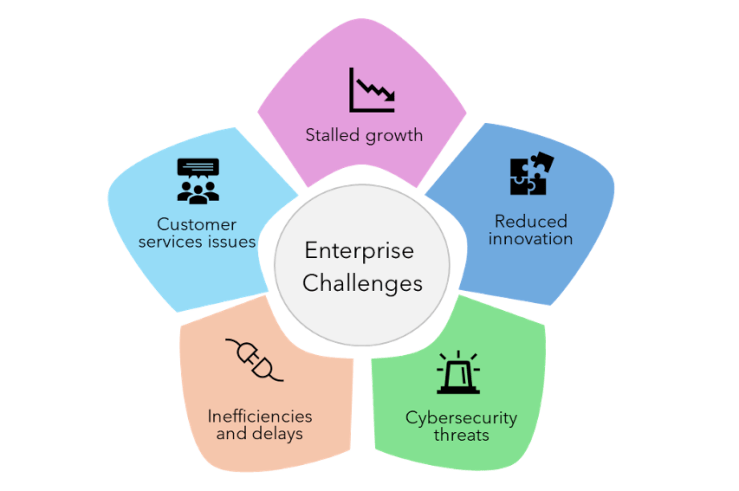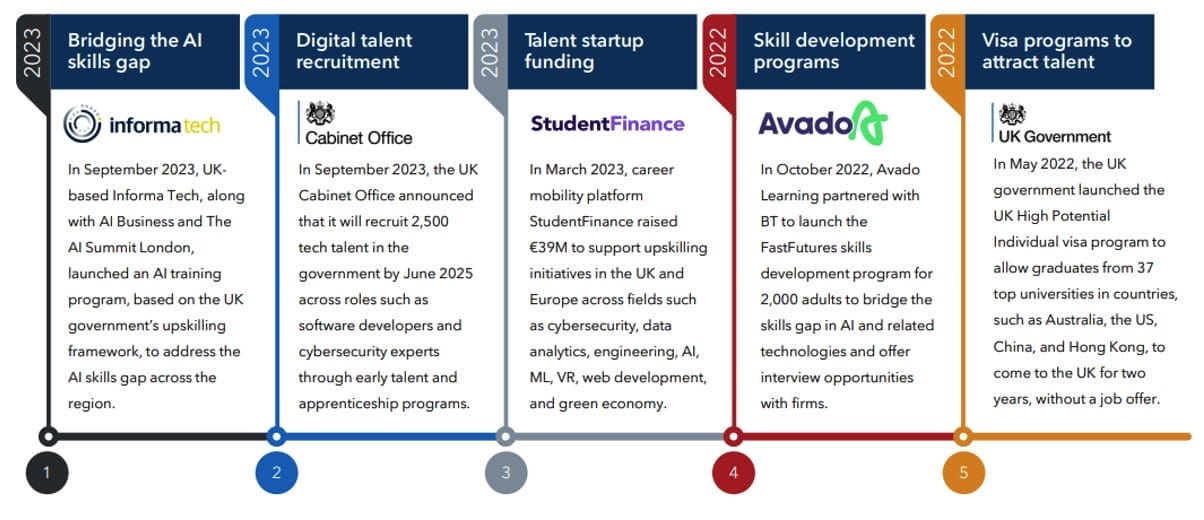The UK is facing a critical digital skills shortage that is impeding its growth ambitions and its desire to establish itself as a global innovation hub. The scarcity of skilled professionals, particularly in AI, cybersecurity, and data analysis, is hindering innovation, curbing productivity, and adversely affecting businesses of all sizes.
According to the UK government’s Cyber Security Skills in the UK Labour Market 2023 report, half of UK businesses have a fundamental cybersecurity skills deficit, while one-third struggle with advanced cybersecurity skills shortages. This results in an approximate shortage of 11,200 proficient professionals required to fulfil the demands of the cyber workforce.
The Cost of the Crunch: Enterprises’ Challenges
Enterprises across major industries in the UK are grappling with the tangible impacts of the digital skills shortage. Here are some key challenges observed:

-
- Stalled growth: Due to a lack of digital talent, UK businesses are struggling to adopt and leverage new technologies effectively, which is leading to reduced efficiency, business growth, and competitiveness in the market. For example, as highlighted by the British Retail Consortium, the lack of skilled talent in areas such as data analytics and digital marketing is hindering retailers’ ability to adapt to changing consumer trends and implement new technologies, leading to stagnation and loss of market share.
- Reduced innovation: Digital skill shortages are hampering digital transformation initiatives, limiting their ability to innovate and introduce new offerings. The absence of a deep understanding of digital tools and platforms and the ability to analyze and interpret data effectively may limit the business’ creativity and agility in responding to market changes and customer needs.
- Cybersecurity threats: Digital skills are essential for implementing and managing effective cybersecurity measures such as firewalls, encryption, and intrusion detection systems. However, the skills gap may result in suboptimal implementation of these measures, leaving critical systems and data vulnerable to exploitation by cybercriminals. Also, the lack of cybersecurity talent is posing a challenge for UK enterprises to deal with mandatory regulatory compliance in the UK, such as the General Data Protection Regulation and the Network and Information Security Directive.
- Inefficiencies and delays: UK companies are experiencing production delays due to a shortage of skilled automation engineers and software developers. This shortage impedes their efforts to scale production capacity and fulfil customer needs within stipulated timelines.
- Customer service issues: The proliferation of digital chatbots, AI-powered virtual assistants, and self-service portals presents challenges for companies in troubleshooting technical issues and system errors. Due to the talent gap, many enterprises lack the requisite in-house expertise to implement and maintain these advanced customer service technologies effectively.
Beyond Recruitment: Strategies for Overcoming the Digital Skills Shortage
While conventional recruitment endeavors are important, UK enterprises must adopt a multifaceted approach to surmount the digital skills shortage. Here are strategies businesses can implement to address this challenge effectively:
- Internal talent development: Enterprises should invest in their existing workforce by promoting a culture of continuous learning. Initiatives such as upskilling programs and internal training can equip employees with the necessary skills to navigate technological innovations. For instance, Tesco collaborated with SkillCast to run a learning and development program aimed at training its workforce across the organization to adapt, upskill, and reskill for facing future challenges.
- Diversity and inclusion in recruitment: Prioritizing diversity and inclusion in recruitment processes enables businesses to tap into a broader talent pool. By actively seeking talent from underrepresented communities and universities with strong STEM programs, enterprises foster an innovative and diverse work environment, enhancing prospects for success.
- Leveraging technology: Automation and AI-powered solutions can optimize workforce efficiency by automating routine tasks, enabling employees to focus on more strategic endeavors. For example, Aviva implemented chatbots to handle routine customer inquiries, leading to a more efficient customer service operation.
- Embracing remote work: Offering flexible work arrangements and embracing remote working options enables businesses to access top talent, irrespective of geographical barriers. For instance, the e-commerce giant ASOS fosters a happier workforce and widens the talent pool significantly by providing remote and hybrid work environments.
- Cultivating a culture of collaboration and idea exchange: Encouraging collaboration, knowledge-sharing, and innovation within an organization can greatly enhance workforce productivity. For instance, Mastercard hosts regular hackathons and innovation workshops to facilitate collaborative problem-solving and creativity among employees. This dynamic and innovative work environment empowers employees to adapt and excel in the evolving digital landscape.

The image shows some initiatives taken by the UK government and businesses to curb the UK region’s digital talent divide.
A United Front for Digital Domination
Addressing the digital skills shortage necessitates a multifaceted approach. Businesses can cultivate a resilient and future-proof workforce by investing in internal talent development, embracing diversity and inclusion, leveraging technology, promoting flexible work arrangements, and fostering a collaborative and innovative culture. Moving beyond conventional recruitment strategies is imperative to create a dynamic environment conducive to learning, collaboration, and success in navigating the digital landscape. This endeavor is about overcoming digital challenges and establishing dominance in the digital frontier.
By Vanshita Agarwal, Senior Analyst

